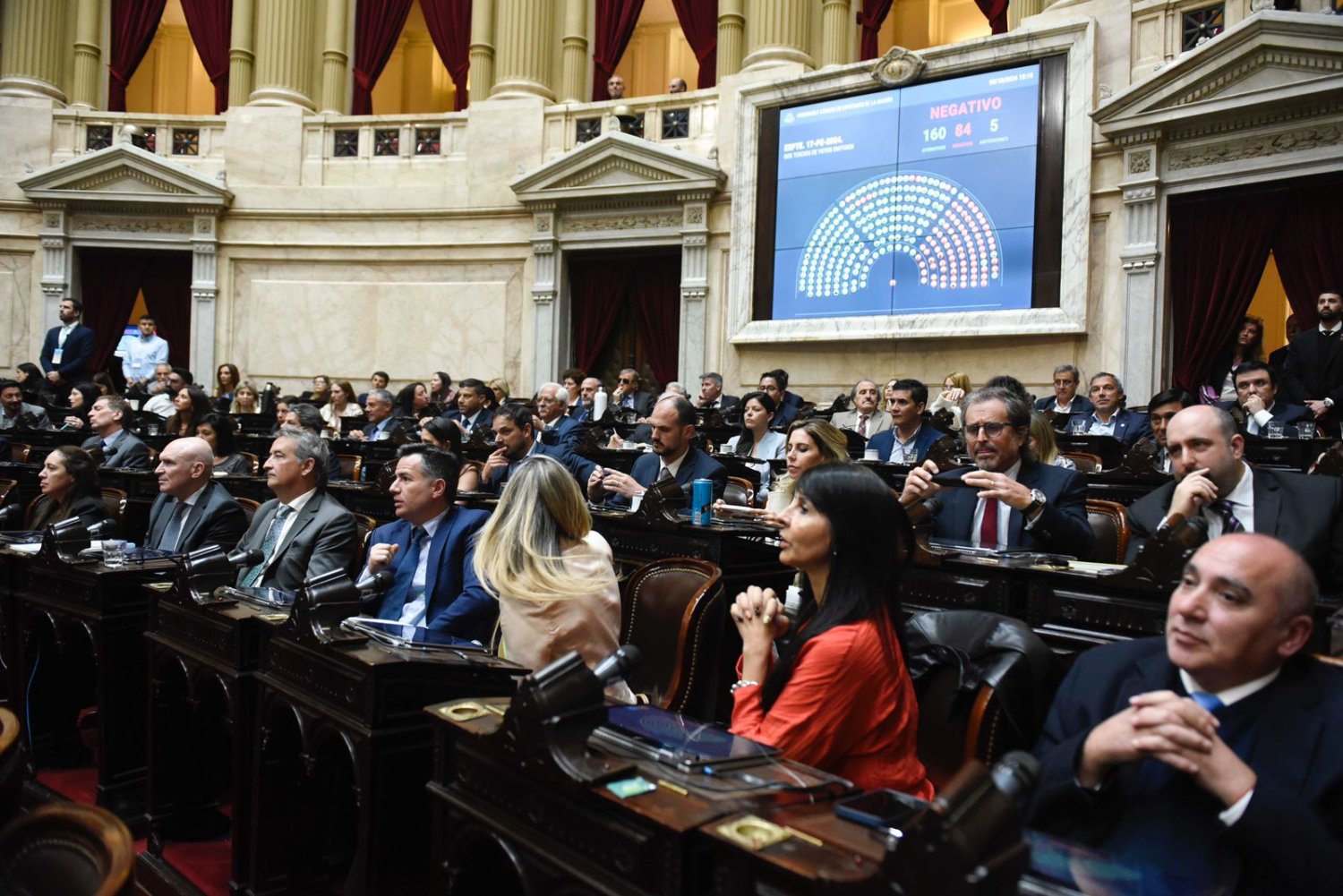
Amid takeovers in faculties throughout the country and a mobilization in front of Congressfinally the government managed to shield the veto on university financing in the Chamber of Deputies. With much difficulty and negotiations until the last minute, he reached the number. The vote came out 160 affirmative and 84 negative, and they were only 3 votes away from reaching two thirds to insist. The law required the government to increase teaching and non-teaching salaries monthly due to inflation and retroactively to December as long as there is no joint agreement with the unions. They are the most delayed salaries of the entire public administration, and beyond the speech of “there is no money” La Libertad Avanza shows its intention to defund the public university.
The key to supporting Mile to support the veto was in his negotiation with Mauricio Macri to align the PRO and with the governors of Tucumán (Jaldo-UP), Catamarca (Jalil-UP) Chubut (Torres-PRO), Misiones (Passalaqua-Renovador, close to Massa), Córdoba (Llaryora-PJ), Santa Cruz (Vidal) In addition to the deputies of the UCR who crossed sides from the veto on retirements. Some contributed with their negative vote to the law (PRO, UCR, former Unión por la Patria, from Santa Cruz from Tucumán), and the others with absences and abstentions despite having affirmatively supported the half-sanction.
Los 84 negative votes In addition to La Libertad Avanza, the PRO bench and other allies, the 3 former Union for the Homeland (of Governor Jaldo), and 4 from the UCR (Campero, Tournier, Arjol and Picat) from the group of the “libertarian radicals”, and Garrido de Santa Cruz.
They defended the financing law by adding to the 160 votes: 96 from Unión por la Patria (which contributed 2 absences), 27 from UCR, 13 from the Pichetto bloc, the Civic Coalition, the entire bench of the Left Front, 4 from Federal Innovation (from Salta and Rio Negro), 2 from the PRO (Baldassi and González), the people from San Juan, the MPN from Neuquén, Acevedo de Santa Cruz, and the former libertarian Lourdes Arrieta.
The abstentions They were the 4 missionaries from Federal Innovation and Pablo Cervi from Neuquén from the UCR (from the group of radicals related to Milei). The 5 abstentions had accompanied the half sanction and now they suddenly changed their mind.
Las absences with notice were those of Carbajal (UCR), Lopez Murphy (Encuentro Federal) and Oscar Zago (MID) who are traveling, and the deputy Steffani of the PRO who is in poor health. But At the last minute, other suggestive absences were added: Alejandra Towers of Córdoba (Llaryora-PJ), Avila de Chubut (Torres-PRO) and one of the people from Salta, Yolanda Vega, who responds to Governor Saenz (they search in Massa). Unión por la Patria contributed its own to help the government: the absence of Fernanda Avila from Catamarca, from Governor Jalil of Unión por la Patria. These 4 counted in favor of the law and their absences were a product of the latest government negotiations.
They defended the financing law adding to the 160 votes: 98 from Unión por la Patria (which contributed 2 absences), 27 from UCR, 13 from the Pichetto bloc, the Civic Coalition, the entire bench of the Left Front, 3 from Federal Innovation (2 from Salta and 1 from Rio Negro), 2 from the PRO (Baldassi and González), the San Juan people, the MPN from Neuquén, Acevedo de Santa Cruz, and the former libertarian Lourdes Arrieta.
When the session began, the government had 84 votes to go against the law. He reached that number with great difficulty, having to negotiate until the last minute. The day before the session, they made an announcement that they are going to increase the guaranteed minimum wage for teaching, a request that the PRO had made but that does not conform to teaching because they continue to have indigent income. Among the yellow party there were many doubts to accompany the vetoand it was Mauricio Macri who had to intercede in the conversations. There was reluctant block discipline in a good part of its members, after the announcement of the government that responded to their request. Even so, they lost 2 Larretista legislators who this time differentiated themselves. In the session, Silvia Lospennato It raised some differences with the government that show that there is latent tension. “It is a real and genuine claim that the government has the obligation to address” he said, and warned “If anyone has the fantasy of privatizing the university, I tell you today you will not count on a single vote from this PRO bloc”. The block leader, Cristian Ritondohad a more friendly speech with the government and attacked the opposition “What matters to them is hitting a government that has parliamentary weakness”. But he did not stop complaining to the government “better management”repeating Mauricio Macri’s criticism.
The government had to continue negotiatingand although it could not add more negative votes, it was due to the absences and abstentions of those who had supported the law. There the governors of Córdoba, Chubut, Catamarca and Salta offered their help to the government.
Although the government justifies the veto by the “fiscal cost” and that it does not specify where to get the resources for the universities, they cannot answer where the “fiscal cost” comes from in the announcement they made on Tuesday night. From the PRO, they did not want to give the exact data but recognized that it is practically the same as that of the Congress law. Nicolás del Caño the libertarian arguments came to the fore: “To give benefits to the Galperíns there is money. For the big millionaires and businessmen there is, but not for the public universities, not for the retirees, not for the doctors at Garrahan, the Bonaparte Hospital and so many other places. This veto ratifies the orientation of this government”.
Christian Castillo from the left questioned that “a small minority of this parliament and a small minority of public opinion impose their decision on the majority as they did with the retirees”. The thing is that the government is showing signs not only of choosing its enemies with the adjustment as well as with retirees and universities, but that it does not want anything to come out of Congress that is an initiative of other blocks. As it has a parliamentary minority, it does so by dint of vetoes and DNU. Castillo, who is also a university professor, warned “Know that each deputy who votes with the veto or is absent or abstains, each student assembly is declaring them persona non grata in the national universities. Today there are no half measures, whoever does not reject the veto plays for the extreme right”. He also criticized the union leadership who negotiate with Milei in the Casa Rosada and do not call for actions. Various unions They withdrew early from the mobilization in Congress, before the vote. The same thing happened with the Bases Law.
During the session, the speech of Miguel Angel Pichetto was harsh against the government: “Probably this afternoon they will win. They think they win, but in reality they lose as they lost with a very important sector of society, which is the retirees”. Although he claimed to the ruling party that “consolidate a parliamentary majority” that contains the “dialogueists”, he asked them: “What is the program they have? A ship without lights at sea? What is the plan? The Martínez de Hoz-style adjustment?”
From the UCRthe head of the block Rodrigo de Loredo He sincerely stated his position “The only thing we are discussing is the size of the adjustment, an adjustment that this bloc has shown to understand is necessary in Argentina to stabilize the economy”. The problem for De Loredo is that “the adjustment for universities is 20% higher than that of the rest of the public sector”. In that sinuous path of adjustment that they share with the government, perhaps lie the reasons for the leaks that they have been experiencing in favor of the libertarians.
Source: www.laizquierdadiario.com

